Have you ever wondered if your furry friend can snack on guava? I think of that time my dog sniffed near the kitchen, wondering what this odd, sugary fruit was. Guava, with its bright color and juicy flesh, packs a bunch of nutrition. Packed with vitamins and fiber, it sounds like a healthy snack, right? There’s the rub, just as there’s always been. Too much can cause upset tummies or allergies. Roll it out and see how they respond. Consider it a fun, tasty detour on your dog’s nutritional travel itinerary. Sharing new treats with our pets makes these tiny moments so special.
Key Takeaways
- You can safely feed your dog guava in moderation. Be sure to introduce any new food slowly to check for any adverse reactions.
- Guava is a nutrient powerhouse! It’s rich in vitamin C, fiber, and antioxidants that strengthen your pup’s immune system and aid healthy digestion.
- Guava is generally safe for dogs; though, it is best to be cautious. The seeds and rind may present choking hazards or digestive issues.
- Start by giving your dog small, fresh, and washed pieces of guava. Watch closely how your pup responds to this tropical treat!
- Check out other dog-friendly fruits such as apples, blueberries, and watermelon. These options provide nutritional benefits and add variety to your dog’s diet.
- Keeping your dog healthy includes feeding it balanced meals, seeing the vet regularly, and knowing what’s good or bad for your dog to eat.
Can Dogs Eat Guava?
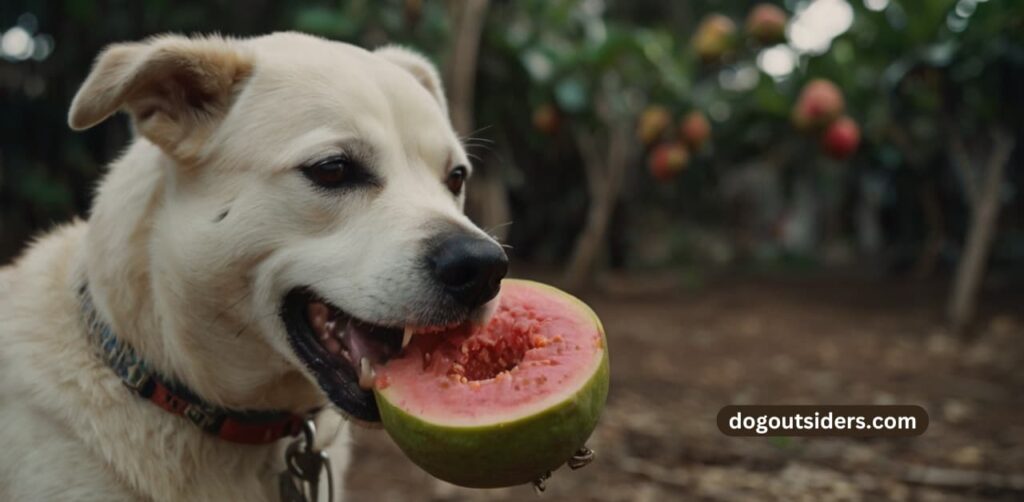
1. Guava for Dogs
A member of the myrtle family, this tropical treat is known for its delicious taste and bright color. Picture this: a green-skinned fruit with juicy pink flesh inside. It’s just like nature’s candy!
What’s so special about guava for our furry pals?
Guava is rich in vitamins A and C, along with important minerals and fibers. Adding guava to your dog’s diet makes for a nutritious treat! It’s even better since it provides these nutrients, good for dogs and people too.
Now, when it comes to feeding guava to dogs, there are different varieties to consider. Think of the common pink guava or the white-fleshed variety. We learned that both are safe for dogs, in moderation.
Remember that guava has a high natural sugar content. This may be a concern for dogs with diabetes or for dogs who are working on losing weight.
While it can be a delightful treat, it should not replace their normal dog food. Did you know 90 percent of your dog’s nutrition should come from their main meals? That’s a neat piece of trivia to know!
2. Safety Guidelines for Feeding Guava
Let’s talk safety regarding guava consumption for dogs. Dogs can safely munch on guava fruit, but only if we follow some simple guidelines. First and foremost, always feed guava in small portions to your furry companion. This helps prevent any kind of digestive health issues.
- I always remove the guava seeds because they can be a choking hazard. This is particularly crucial for small breeds or dogs that are prone to gulping their food. Once you have introduced the juicy guava to your dog, watch out for any adverse reactions. A little observation goes a long way in ensuring their well-being.
- If you feel uncertain about canine consumption of guava, a quick conversation with your vet can help put your mind at ease. After all, they know your dog’s dietary needs best and can offer tailored advice. Remember, introducing new foods like guava should be done with care to avoid any potential risks.
- Incorporating fresh guava fruit into your dog’s diet can be a delightful treat, but moderation is key. Regularly monitor your dog’s reaction to this exotic fruit to ensure it complements their overall gut health.
- Ultimately, ensuring that any new food items fit into your dog’s balanced diet is crucial. With the right precautions and proper preparation, guava can be a nutritious addition to your dog’s occasional snacks.
3. Recognizing Signs of Allergy or Discomfort
Now, how would we identify that guava doesn’t sit well with our dog? Knowing the signs is half of the battle.
- Some common allergic reactions include itching or hives. It’s like when we accidentally eat something that doesn’t agree with us.
- For dogs, gastrointestinal symptoms such as diarrhea or vomiting may be warning signs.
It’s really important to monitor your dog closely, especially after you’re introducing new foods.
I always watch carefully after I’ve given my dog something new, just to be safe. If you have a severe allergic reaction, don’t be afraid to ask a vet for help. They’re the professionals and can offer the care you need.
Nutritional Benefits of Guava for Dogs
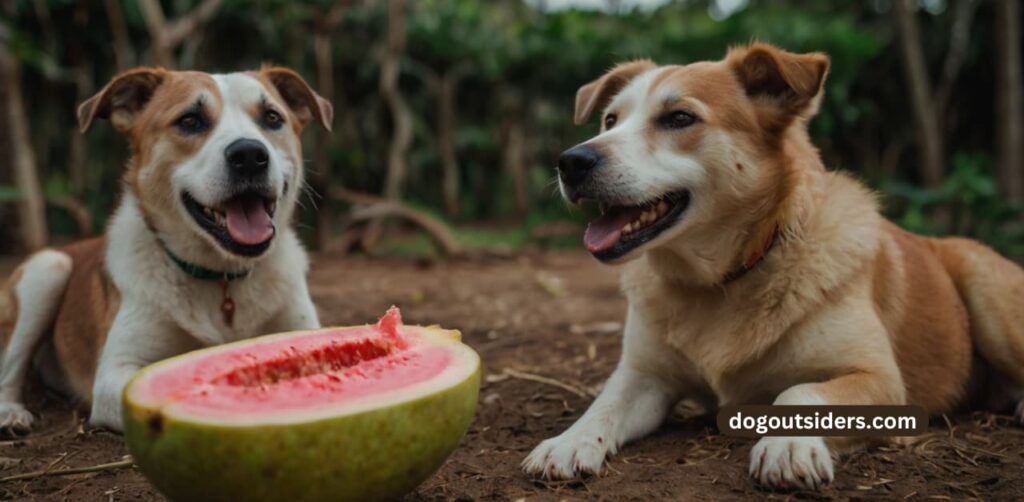
Vitamins and Minerals in Guava
I won’t forget the first time I gave my dog a taste of guava. She seemed confused at first, but then gobbled it right up.
- Well, guava is like a treasure chest full of essential vitamins and minerals. It’s not just a sweet treat; it’s loaded with goodies such as vitamin C, which is very important for dogs. Vitamin C helps strengthen their immune system so they can fight off all those nasty germs. It’s one of the richest sources among fruits, so it’s a real powerhouse.
- Now, let’s talk about vitamin A. This vitamin is important for good vision. Similar to humans, it helps dogs see better, particularly in low light. Vitamin A supports growth and development. If you’ve got a pup, this is key!
- Guava also has vitamin E and K, which are crucial in their own ways. Vitamin E is a powerful antioxidant that protects your cells from damage. Meanwhile, vitamin K is necessary for blood clotting.
- Then there are the essential minerals like calcium and magnesium. These support bone and muscle health, ensuring your dog can run, jump, and play without a problem.
- We can’t forget about the B vitamins. They’re essential for energy metabolism. If you’ve got an active dog, these vitamins keep it fueled and ready to chase that ball.
By adding guava to its diet, you’re giving it a health boost that’s both tasty and beneficial.
| Nutrient | Amount per 100g | Benefits for Dogs |
| Calories | 68 kcal | Provides energy |
| Protein | 2.6 g | Supports muscle maintenance |
| Fat | 0.9 g | Low fat content, easy to digest |
| Carbohydrates | 14.3 g | Source of energy |
| Dietary Fiber | 5.4 g | Aids digestion |
| Vitamin C | 228 mg | Boosts immune system |
| Vitamin A | 31 µg | Enhances vision |
| Potassium | 417 mg | Supports heart and muscle function |
| Magnesium | 22 mg | Supports bone health |
Antioxidants and Fiber Benefits
Guava isn’t just vitamins and minerals; it’s filled with antioxidants.
- These are like little soldiers battling free radicals in your dog’s body. Free radicals can lead to oxidative stress, which isn’t good for their health. With the antioxidants from guava, you’re helping your dog combat these nasties, supporting overall health and longevity.
After all, who wouldn’t want their fluffy companion to live for as long as possible?
Then there’s the fiber.
- Guava is a good source of dietary fiber, which is a big deal for digestion. I’ve seen when my dog eats guava, her digestion seems to be smoother. Fiber helps get things moving, so all that goes right.
For dogs that may be a bit more rotund, fiber can help with weight management. It makes them feel full without piling on the calories.
- The fiber in guava dissolves in water and forms a gel-like substance in the digestive tract. This helps slow down digestion, enabling dogs to better absorb nutrients.
It’s like giving their body a chance to soak up all the goodness guava has to offer.
You should make wet or dry food 90% of their nutrition. Guava serves as a healthy treat to add variety and plenty of benefits to their diet.
Potential Health Risks of Guava
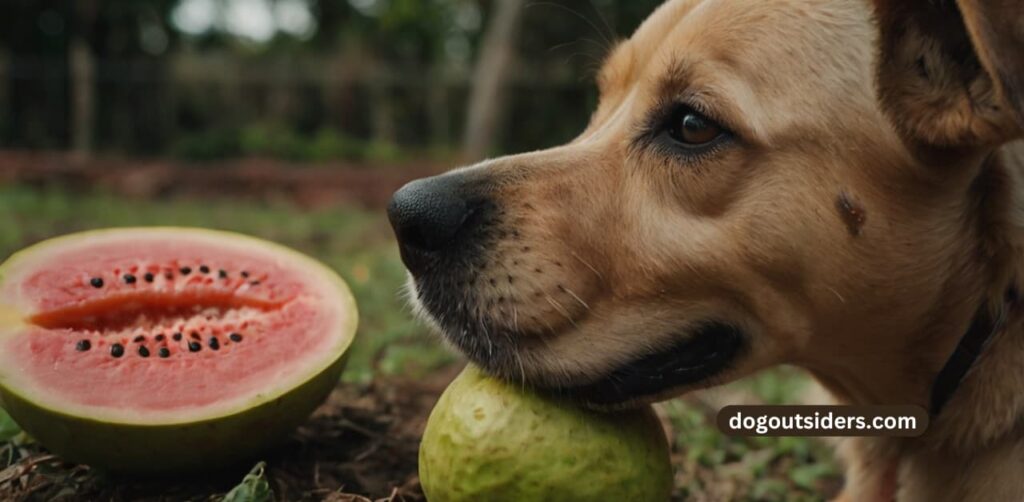
Possible Side Effects for Dogs
Whether I want to introduce a new treat to my pup, like guava, I start to panic. I’m always concerned about the risks associated with it.
The most common issue for dogs is stomach upset or diarrhea after eating guava. It’s like when we binge on sugar and later regret it. Dogs can have the same reaction, especially if they’re not used to the fruit.
There’s the risk of intestinal stoppage.
Just picture what would happen if a dog swallowed a big piece of guava—those slips don’t necessarily digest well in a dog’s stomach. It can cause a blockage that may require a vet’s assistance to clear up.
I always chop up the guava into small, bite-size pieces for my dog.
The key here is moderation. It’s important to note that giving your dog too much guava can lead to more than just a tummy ache.
I typically monitor my dog when they eat guava to look out for anything unusual. If they start getting weird, it’s a clear sign I need to intervene. I might even call the vet if they seem uncomfortable.
The idea is making sure they’re happy, making sure they’re healthy — not having an upset stomach.
Avoiding Overconsumption Issues
I learned that when it comes to guava treats, less is more.
I enjoy spoiling my dog with delicious food, but I resist. I aim to keep guava treats at less than 10% of their daily calories.
This way, I’m working to prevent any digestive issues before they even begin.
It’s completely about portion control.
I begin by offering my dog a tiny piece of guava and observe their reaction. Then gradually, I’ll give a little more, but I’m just watching to see if anything changes.
This gradual introduction helps me get a sense of their tolerance and ensure they’re doing all right with this new treat.
I also have to remind myself that guava can never be a staple in my dog’s diet. It’s a treat, not a staple.
Guava’s natural sugars can create difficulties for some dogs. This is especially true for dogs with diabetes or those who are more likely to gain weight.
I also try not to overindulge when it comes to guava. I like it as a snack here and there but not as part of my everyday meals.
Introducing Guava to Your Dog’s Diet
1. Safe Serving Sizes for Dogs
When I first started thinking about adding guava to my dog’s diet, I wanted to make sure I was doing it right. I wanted to give my dog the best nutrition.
Understanding the right serving size is incredibly valuable. Dogs come in all shapes and sizes, and so should their guava portions.
For small dogs, like Chihuahuas or Yorkies, a small piece of guava will do. Look for a piece about the size of a small coin—it’s perfect!
Medium dogs, like Bulldogs or Beagles, could enjoy a big slice more. Larger breeds, like Labradors and German Shepherds, can even indulge in guava a bit more than smaller dogs.
Just remember, guava should be an occasional treat, not a daily snack.
I strongly suggest you contact your vet for specific advice. They’ll even have a suggested serving size for your pooch based on their specific nutritional requirements.
Here’s a quick guide to help:
- Small breeds: A small coin-sized piece
- A slice about the size of a small grape.
- A slice similar in size to a small apple wedge.
If you begin with small pieces, you’re testing your dog’s reaction. It’s like dipping your toe in the water before diving in.
Keep it a treat; make it something special, something they anticipate. If you have any concerns at all, your vet is only a phone call away.
2. Preparing Guava Properly
Before you give your pup a taste of the delicious guava fruit, it’s important to know how to prepare this tropical fruit. First things first—washing the guava is non-negotiable. This step removes pesticides or dirt, ensuring a healthy addition to your dog’s diet. If you’re concerned about the skin, peeling it is an option, as some dogs may have difficulty with the texture.
Next comes the chopping part. I cut ripe guava into tiny, bite-sized pieces every time. It’s similar to serving bite-sized snacks at a party—easy to munch on and reduces choking risk, making it a safe way to introduce new fruits into their diet.
One of the most important aspects here is to get rid of those guava seeds. These little guys can be hard for dogs to digest and may cause intestinal blockages. It’s always best to err on the side of caution and throw them away to prevent any potential risks.
Properly preparing guava makes it not only safer for your dog but also easier to enjoy the fruit’s unique flavor. Then they can just relish the fruity goodness without any hitches, benefiting from the numerous health benefits of this nutritious fruit.
Offering occasional guava treats can enhance your dog’s dietary needs, providing essential nutrients and a tasty treat. With the right preparation, guava can be a delightful addition to your dog’s food plan, ensuring they enjoy a variety of healthy compounds in their diet.
3. Monitoring Your Dog’s Reaction
After your dog has tried guava fruit, monitor them for a few hours to ensure their digestive health remains intact. Canines, just like us, can react differently to unfamiliar foods, including guava consumption. Some may enjoy the sweet taste of this tropical fruit, wagging their tails happily, while others may experience gastrointestinal issues.
I keep a little journal of anything that stands out, noting any noticeable changes in their behavior or health. If they’re allergic to certain fruits or have an upset tummy — perhaps itching or discomfort — I can address it immediately. Now I have a record ready to share with the vet, which is essential for understanding their dietary needs.
It’s sensible to wait a few days before introducing another new food, especially when considering the nutritional composition of different fruits. This way, you can determine if any reaction is due to guava or another food item.
If you see anything worrisome, such as sustained vomiting or diarrhea after guava consumption, contact your vet. Better to be safe than sorry when it comes to your furry companion’s health, right?
Other Fruits Safe for Dogs
Suitable Alternatives to Guava
Mango and watermelon are other fruits I think of when I’m considering guava consumption substitutes. These fruits aren’t just tasty; they’re perfectly safe for dogs to munch on, making them excellent alternative fruits.
- Mangoes burst with sweet and juicy flesh, and they’re loaded with essential nutrients like vitamins A, C, and E, along with a healthy dose of fiber! Remember, always remove the pit, as it can be a choking hazard for canines.
- Watermelon, especially on a hot summer day, can be incredibly refreshing for dogs. It’s packed with vitamins A and C, and it’s mostly water, making it a hydrating snack. Just don’t forget to remove the seeds and rind to avoid any potential risks.
- What about the vegetables? Carrots and sweet potatoes can also be good for our canine friends, providing a nutritious addition to their diet.
- Carrots are crunchy and fun to chew, offering beta-carotene and fiber, which are great for a dog’s digestive health and vision.
- Sweet potatoes, on the other hand, are rich in vitamins B6, C, and manganese, making them a beneficial component of a dog’s food plan.
- It’s really important to add variety to what our dogs eat. It keeps them interested and engaged, plus it ensures they get a mix of nutritional goodness.
- For variety, how about some seasonal fruit? Apples in the fall and berries in the summer are good choices that can enhance their fruit consumption.
Incorporating these fruits and vegetables not only satisfies dogs’ taste buds but also contributes to their overall gut health and dietary needs.
Fruits to Avoid for Dogs
Now, let’s talk about the fruits that are a big no-no for dogs.
- Grapes and cherries are at the top of the list. Grapes can be downright toxic and may lead to kidney failure in pets. Cherries contain cyanide, which is also bad for our four-legged friends.
- Packed with potassium and vitamins, bananas are a healthy treat for dogs. Too many can lead to too much sugar, and that’s not healthy for them.
- I always recommend having a general list of safe and unsafe fruits. Keeping it handy can save you a lot of stress and worry!
- Beware of avocados. They have persin, a substance that can be toxic to dogs if they consume it in large amounts.
Some fruits can give a nutritional boost if fed in moderation. Safety first; it really is better to be safe than sorry.
Maintaining Overall Canine Health
Balanced Diet Importance
Our furry friends need balanced diets to stay healthy. It’s not just a term; it’s the key to a healthy life for them.
So, what constitutes a balanced meal for our dogs?
- It’s a combination of proteins, fats, and carbs. Proteins build the muscles and tissues. Fats, on the other hand, provide energy and promote the absorption of fat-soluble vitamins. Carbs give those happy runs and wagging tails the energy they need.
- Fruits and veggies are magical. They provide an extra dose of nutritional punch. For example, guava—yes, the very one—socks it to you with antioxidants to fight off free radicals and other effects of oxidative stress.
- Plus, it’s packed with vitamin C, which strengthens the immune system and keeps that coat shiny and healthy.
- The fiber in guava? It’s a digestive hero, fighting against constipation and keeping things moving along.
- Balance is key, and it is possible to overdo it. If you eat an excess amount of natural sugars in guava, you’ll become obese or develop diabetes.
- I always recommend chatting with a vet. They’re the best people to advise on creating a diet that works with your dog’s individual needs.
That way, you make sure they’re getting a balanced blend that powers their energy and nurtures their health.
Regular Exercise Needs
Now let’s get those paws moving with some exciting activities that can enhance your dog’s overall health. Regular exercise is the secret sauce to keeping our dogs fit and fine, complementing a healthy diet rich in essential nutrients. This balanced approach helps maintain a healthy weight, which is crucial for preventing complications such as joint pain or heart disease.
What sort of fun activities can you do with your dog? Think fetch, agility training, or even just a walk in the park. Each of these enjoyable activities offers a wonderful way to connect with your furry companion, both physically and intellectually.
Additionally, consider incorporating fresh fruits like guavas into their diet as occasional snacks. Dogs can benefit from the nutritional content of certain fruits, including the unique flavor and potential health benefits of guava fruit.
Dogs thrive on routine, so having a set exercise schedule is a bonus. Regardless of age, it keeps them happy and healthy. Moreover, ensuring that their diet is balanced with nutritious fruits can further support their digestive health and overall well-being.
Engaging in regular exercise and offering new food items, such as guava treats, can significantly contribute to your dog’s vitality. By doing so, you not only strengthen your bond but also promote optimal gut health and nutrient absorption.
Incorporating these fun activities and dietary enhancements into your dog’s life can lead to numerous health benefits, ensuring they remain active and joyful. Always consult veterinary advice before introducing new foods to your dog’s diet to avoid any potential risks.
Ultimately, the combination of exercise and a nutritious diet creates a rounded approach to your dog’s health, making each day an exciting treat for both you and your lovely pup.
Ensuring Proper Hydration
Finally, don’t underestimate the power of plain H2O.
Your dog staying hydrated is crucial. Fresh water should always be available, as it promotes digestion and all important bodily functions.
- This is especially true when you introduce something new, like guava.
- Because guava is mostly water, it’s a great light snack on hot days.
- They’re a choking hazard too, so be vigilant.
- Watch for how much water your dog is taking in when testing new foods.
- While they nibble on fruits such as guava, offering them some water can aid digestion.
- A small amount of awareness towards their water bowl gets you a long way to keeping them healthy and happy.
Conclusion:
I hope that helps, but there you have it.
Guava can be a delicious snack for our furry friends. It’s a vitamin-packed fruit high in fiber that provides a sweet boost.
Like pizza, sharing a lot of it requires moderation. As always, watch your pup’s reaction carefully. You can start small and look for any signs of tummy trouble or allergies.
- As with us, dogs have their quirks.
- Trying new foods for your pooch can be enjoyable and satisfying.
- Make it an adventure, like exploring obscure treasures in a city.
- Why stop at guava?
- Try other dog-safe fruits too.
- Keep in mind, your dog’s health comes first.
- Just make it easy and safe.
- Have a question or a new fruit idea of your own?
- Hit the comments; let’s talk about it!
- Sharing is caring, after all.
- Your pup’s got a good life; why not give them a fruity surprise and make that tail wag!
Frequently Asked Questions
The short answer to the question “Can dogs eat guava fruit?” is that it’s safe and nutritious. However, always remember to remove the guava seeds and skin before feeding it to your dog to prevent choking hazards and ensure proper digestion.
Guava is a nutritional powerhouse packed with vitamins A and C, fiber, and antioxidants, offering numerous health benefits that support your dog’s immune system and digestive health.
Excessive guava consumption can lead to digestive distress in dogs, including diarrhea, while guava seeds pose a choking hazard; thus, always introduce this tropical fruit slowly to your dog’s diet.
Begin with small, seedless pieces of fresh guava fruit. Monitor your dog’s reaction to this new food introduction. If you notice no ill effects, you can gradually increase the amount, but ensure it isn’t their primary food source.
Dogs can enjoy various fruits like apples, bananas, blueberries, and watermelon, but it’s important to consider guava consumption, ensuring seeds are removed and serving in moderation to prevent digestive health issues.
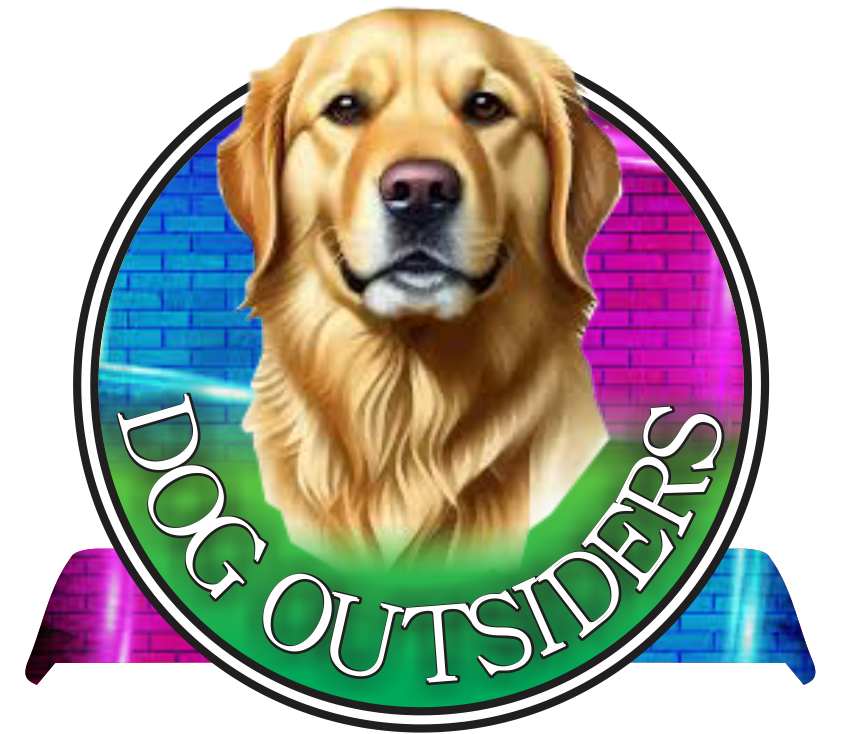

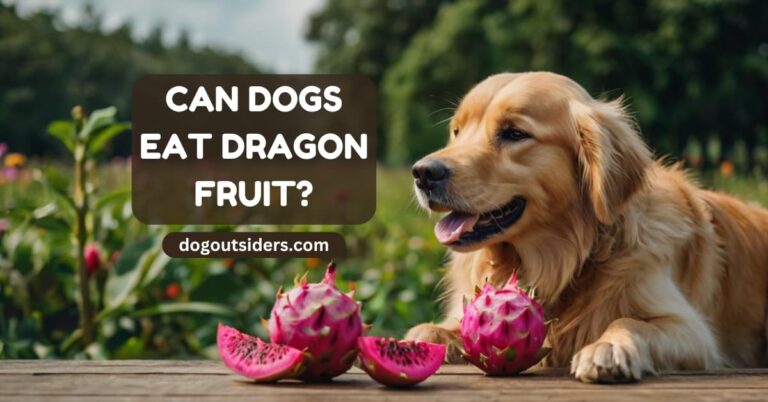




3 Comments